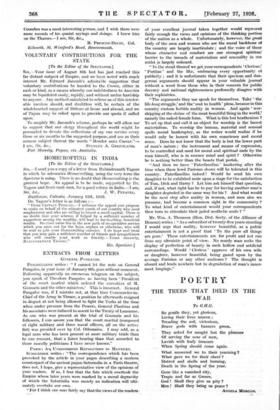EXTRACTS FROM -LETTERS GENERAL .PANGALOS.
PHILHELLENE writes : " I cannot let the note on General Pangalos, in your issue of January 9th, pass without comment. Following apparently an erroneous telegram on the subject, you speak of Theodore Pangalos as having been ' President of the court martial which ordered the execution of M. Gounaris and the other ministers.' This is incorrect. General Pangalos was, if I mistake not, at that time Commander-in- Chief of the Army in Thrace, a position he afterwards resigned in disgust at not being allowed to fight the Turks at the time when under pressure from the Powers, General Plastiras and his associates were induced to assent to the Treaty of Lausanne. As one who was present at the trial of Gounaris and his followers, I can assure you that the court martial (composed of eight military and three naval officers, all on the active list) was presided over by Col. Othonaios. I may add, as a legal man who has been present at more military trials than he can recount, that a fairer hearing than that accorded to those rascally politicians I have never known."
PARIS: AND UNRECORDED REVOLUTION IN MANNERS.
SUBSCRIBER writes : "The correspondence which 14s been provoked by the article in your pages describing a modern counterpart of the ancient pagan Saturnalia in a Paris theatre, does not, I hope, give a representative view of the opinions of your readers. If so, I fear that the fate which overtook the Empire whose later years were marked by a moral depravity of winch the Saturnalia was merely an indication will ulti- mately overtake our own.
"For I think one may fairly say that the views of the readers of your excellent journal taken together would represent fairly enough the views and opinions of the thinking portion of the nation as a whole. Unfortunately, however, the great body of the men and women who are the moral backbone of the country are largely inarticulate ; and the voice of those whose character and conduct are our strongest spiritual barrier to the inroads of materialism and sensuality in out midst js largely unheard.
" In the stead thereof we, get your correspondents Clericus; ` Puritan' and the like, embracing every opportunity ot. publicity ; and it is unfortunate that their specious and dan- gerou4 arguments should appear in your valuable journal withodt a word from those who in their concern for public decency and national righteousness profoundly disagree with their sophistries.
"The arguments they use speak for themselves. Take ' the life-long struggle,' and the ` cost to health' pleas, because in this, country custom forbids nudity in women. .And again Wor- shipping at the shrine of the most beautiful thing in the world,' namely the naked female form. What is this but heathenism ?_ To set up that and call it an object for worship is the basest materialism. To worship the human, material and sensual spells moral bankruptcy, as the writer would realize if he would only be honest with his own conscience and moral sense. Does he not know that the body is but the lower part of man's nature ; the instrument and means of expression,, to be controlled and used for moral and spiritual ends by the man himself, who is in essence mind and spirit ? OtherWise he is nothing better than the beasts that perish.
"And then we have ` Paterfamilias' hankering after the time when these lewd Parisian shows will be tolerated in thiS country. Paterfamilias indeed! Would he send his own daughter to be exhibited nude upon a stage for the satisfaction of Toin, Dick and Harry ? Let him ask himself that question, and, if not, what right has he to pay for having another man's daughter degraded in the same way for his ? And what would be the next step after nudity in women, and men also we presume,. had become a common sight in the community ? To what kind of entertainment would your correspondents then turn to stimulate their jaded aesthetic souls ? "
Mr. Wm. A. Thomson (Hon. Dist. Secty. of the Alliance of Honour) writes : "As a subscriber of twenty-five years standing I would urge that nudity, ' however beautiful, as a public entertainment is not a proof that ` To the pure all things are pure.' These entertainments are for profit and not run from any altruistic point of view. No manly man seeks the display of perfection of beauty in such hollow and artificial surroundings. Would Clericus ' approve of his own wife or daughter, however beautiful, being gazed upon by the average Parisian or any other audience ? The thought is absurd and leads nowhere but to degradation of man's inner- most longings."






















































 Previous page
Previous page